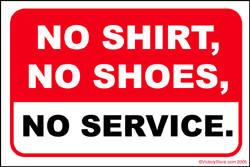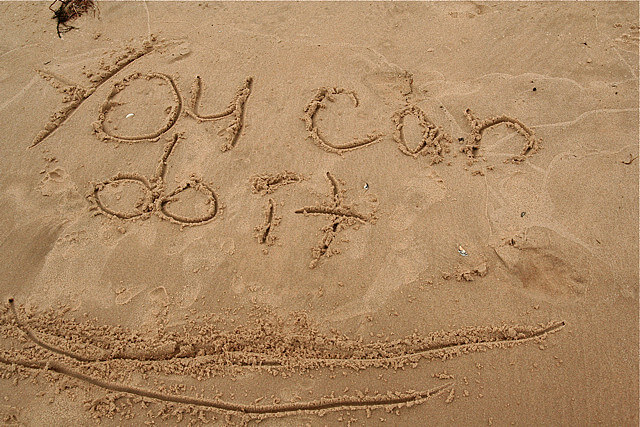Setting solid boundaries is a way to express your self-respect and confidence to others. Boundaries are personal lines that show others who you are and who you are not. Boundaries also show others what you will do and what you will not do. The clearer that line is drawn, the greater the opportunity for others to know the true you.  If the line in the sand is windswept or washed away by the rising tide, for example, the more risk you take in assuming others know what to expect from you. In any relationship, if solid boundaries are not in place, it can be difficult to keep others from invading your space and emotional energy. Without a personal plot of emotional real estate (boundaries) as a foundation, there’s not a lot of room for self esteem and individual morals to exist. Eventually you might begin to feel crowded and overwhelmed by others emotions and behaviors.
If the line in the sand is windswept or washed away by the rising tide, for example, the more risk you take in assuming others know what to expect from you. In any relationship, if solid boundaries are not in place, it can be difficult to keep others from invading your space and emotional energy. Without a personal plot of emotional real estate (boundaries) as a foundation, there’s not a lot of room for self esteem and individual morals to exist. Eventually you might begin to feel crowded and overwhelmed by others emotions and behaviors.
It’s far to easy to become a helicopter-parent or enable others when personal boundaries are not fully in place. Unsure how clear your boundaries are? Review the following situations listed below, then think about the last time you might have experienced them:
1. Feeling bad or guilty when saying no.
2. Giving up personal values or rights to please others.
3. Taking personal responsibility for the way someone else feels.
4. Not speaking up or expressing how you feel when treated poorly.
5. Taking on someone else’s inconsequential emergencies as our own.
There are other examples that can be included in this list, but I hope this list may have helped you determine the true state and condition of your boundaries. Unsure where you’re boundaries need tweaking? Kathie Keeler at www.tgcoy.com offers additional ways to identify where you might need reinforcement.
Not Easy, But Worth It!
For some setting boundaries can come easily and for others it can be more difficult to express and develop them. If you are one who struggles with setting healthy boundaries, take courage. Like many other things, it’s a skill! Using it often and firmly will sharpen and tone your ability; Use it rarely and watch it slacken. Not sure where to start? Here are 4 TIPS you can use to solidify the boundaries you currently have or to draw new boundaries to get your life back:
TIP #1. Define your rights.
Decide which personal rights you are entitled to and why. If you haven’t yet set a clear, distinct moral system in place for your life, now is the time to do so. Take out a piece of paper and start there. Write these items down. Reading them over frequently or memorizing them will provide support when you feel challenged.
TIP #2. Take small steps to express yourself.
Identify areas that you feel you might be taking on someone else’s problems a little too much and talk with them about it. Express clearly to them why you feel that way. Something as simple as “I’d be willing to talk about ___ when you are not as emotionally upset, do you need some time to cool off?” can deliver a simple and clear message. Essentially, you are stating that you’re not comfortable taking their emotions upon yourself, but you will problem solve with them when they can speak more rationally. Fear, guilt and self doubt can limit your effectiveness and stop you from following through. It may help to practice with someone you trust or in front of a mirror until you feel you can represent your rights.
 This approach can be a little awkward at first if that line in the sand has not been drawn in the past. But I encourage you to be assertive and restate your position calmly and confidently. If doing things in the moment doesn’t feel right, for example you might be in public, then pulling the individual aside later and expressing your position might be more tactful. If this is the first time, there is the chance they may test the line by crossing it. What do we do then?
This approach can be a little awkward at first if that line in the sand has not been drawn in the past. But I encourage you to be assertive and restate your position calmly and confidently. If doing things in the moment doesn’t feel right, for example you might be in public, then pulling the individual aside later and expressing your position might be more tactful. If this is the first time, there is the chance they may test the line by crossing it. What do we do then?
TIP #3. Stand your ground.
Others may either purposefully or accidentally cross into your newly established boundary. When this happens, confidently restate your position on the matter. If they persist or don’t take you seriously, then it’s time to turn on the broken record. Repeat yourself again and again if needed until it sinks in. If asked why you are suddenly taking a stand on something you can tell them, just as you practiced in TIP #2. An example might be, “I am not comfortable with you taking my car so late at night. I have the right to say what happens to my stuff.” repeat as necessary.
TIP #4. You cannot control how others will react.
It is hard to know how someone will react when you draw that line in the sand. How they respond is not your responsibility. You can however control how you react. Don’t get emotional in the moment, keeping the context within a logical and relaxed mindset will be much easier. If someone constantly refuses to respect your boundaries let them burden lay on them to sort things out, you should not carry their feelings or actions on your shoulders.
Don’t mistake someone else’s kindness and generosity for reasons to erase one of your lines. There should not be any instance that justifies giving up your rights or morals. There is a lot that can be learned through trial and error on this topic, however if you wish to read more I found a great article with more tips that can help you reinforce and strengthen your boundaries. In this article, Margarita Tartakovsky at psychcentral.com suggests what specific words to say, or not say, when establishing appropriate boundaries. Most of all, remember, you can do it!
Keeler, K. (2010, February 14). 10 Examples of Clear Boundaries. Retrieved May 4, 2015, from http://www.tgcoy.com/addiction/parenting-tips/1393.html
Tartakovsky, M. (2015, February 13). Why Healthy Relationships Always Have Boundaries & How to Set Boundaries in Yours. Retrieved May 4, 2015, from http://psychcentral.com/blog/archives/2015/02/25/why-healthy-relationships-always-have-boundaries-how-to-set-boundaries-in-yours/
About The Author
Brook Price dedicated himself to helping others early in his life. He grew up in Sunny Orange County California, then joined the Marine Corps at the age of 21 serving five and half years as a helicopter crew chief and then as chief accountant. His journey with this type of work began when he volunteered as a Young Marines Instructor during his time in the Marines, helping kids get off the street, improve their lives and develop as a leader. After his tour Brook left the Marines to pursue a career in experiential therapy by attending Southern Utah University where he majored in outdoor recreation with a minor in psychology.
Brook has seventeen years experience working for a variety of different therapeutic and transitional programs across the nation. His thirst for knowledge drove him to learn and study successful therapeutic models and programs across the country, most notably Outward Bound. Brook has experience working with therapeutic, residential, military, wilderness and transitional programs for adults and adolescents.


